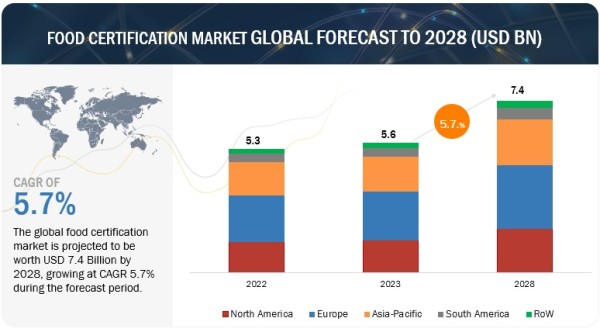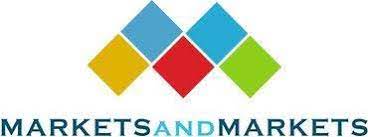The food certification market is estimated at USD 5.6 billion in 2023 and is projected to reach USD 7.4 billion by 2028, at a CAGR of 5.7% from 2022 to 2028. The significance and expansion of food certification stem from multiple factors. In an interconnected world where food is sourced and distributed globally, guaranteeing food safety and quality has become a top priority. Food certification acts as a dependable mechanism, verifying compliance with established standards and regulations to mitigate the risks of contamination, foodborne illnesses, and other health hazards. The growing consumer consciousness and demand for healthier, sustainable, and ethically produced food have elevated the role of certification schemes. Certifications such as organic, fair trade, and non-GMO offer assurance that food is produced using environmentally friendly practices, fair labor conditions, and without genetically modified organisms. By providing transparent information, certifications empower consumers to make informed choices aligned with their values, promoting responsible consumption.

Download PDF Brochure: https://www.marketsandmarkets.com/pdfdownloadNew.asp?id=82063283
What is food certification?
Food certification is a process by which a third-party organization assesses and verifies that a food product or a food-related process complies with specific standards, regulations, or criteria. The goal of food certification is to ensure that food is safe for consumption, meets quality standards, and adheres to certain guidelines set by regulatory authorities or industry bodies.
Certification can cover various aspects of the food supply chain, including production, processing, packaging, and distribution. Different types of certifications may focus on specific attributes such as organic farming practices, fair trade, halal, kosher, non-GMO (genetically modified organisms), sustainability, and more.
Food Certification Uses:
1. Quality Assurance: Food certifications provide assurance to consumers that the food they are purchasing meets specific quality standards. This includes factors such as taste, texture, and nutritional content.
2. Safety Standards: Certifications ensure that food products comply with safety regulations and standards. This covers aspects like hygiene, handling, and the absence of contaminants, ensuring that the food is safe for consumption.
3. Compliance with Regulations: Food certification helps food producers and manufacturers comply with local and international regulations. This is crucial for accessing and maintaining access to different markets, as many countries have specific requirements for imported food products.
4. Traceability: Certifications often involve traceability measures, allowing for the tracking of food products from their origin to the end consumer. This is important for identifying and addressing any issues related to food safety or quality.
5. Market Access: Many international markets require food products to meet certain certification standards before they can be imported and sold. Certifications facilitate market access and contribute to the global trade of food products.
5. Consumer Confidence: Having a recognized food certification logo on a product instills confidence in consumers. It signals that the product has undergone rigorous testing and meets specific quality and safety standards.
6. Environmental and Ethical Considerations: Some certifications focus on environmentally friendly and ethical food production practices. This can include organic certifications, fair trade certifications, and sustainability certifications, indicating that the food was produced in an environmentally and socially responsible manner.
7. Allergen Information: Certain certifications address allergen-related concerns. They provide information to consumers about the presence of common allergens in the food product, helping individuals with allergies make informed choices.
Make an Inquiry: https://www.marketsandmarkets.com/Enquiry_Before_BuyingNew.asp?id=82063283
The Europe market is projected to contribute the largest share for the food certification market.
The Europe region is the dominant market for food & beverages and is expected to be the largest for food certification as well. The food industry in Europe is gigantic. Europe has established robust regulatory frameworks for food safety and quality. The European Union (EU) has implemented various regulations and directives, such as the General Food Law, Hygiene Package, and Novel Food Regulation. These regulations require food businesses to comply with strict standards and undergo certification processes to ensure food safety. As a result, the demand for food certification services is high in Europe. The European region’s high standards and stringent regulations often influence global food safety and quality standards. International organizations, such as the Codex Alimentarius Commission, take into account European standards when developing global guidelines. This influence extends to certification schemes, where European certification bodies and standards have gained recognition worldwide.
Key Market Players:
DEKRA (Germany), SGS (Switzerland), Intertek (UK), AsureQuality (New Zealand), and Bureau Veritas (France) are among the key players in the global food certification market. These players in this market are focusing on increasing their presence through agreements and collaborations. These companies have a strong presence in North America, Asia Pacific and Europe.
Get 10% Free Customization on this Report: https://www.marketsandmarkets.com/requestCustomizationNew.asp?id=82063283
About MarketsandMarkets™
MarketsandMarketsTM has been recognized as one of America’s best management consulting firms by Forbes, as per their recent report.
MarketsandMarkets™ is a blue ocean alternative in growth consulting and program management, leveraging a man-machine offering to drive supernormal growth for progressive organizations in the B2B space. We have the widest lens on emerging technologies, making us proficient in co-creating supernormal growth for clients.
Earlier this year, we made a formal transformation into one of America’s best management consulting firms as per a survey conducted by Forbes.
The B2B economy is witnessing the emergence of $25 trillion of new revenue streams that are substituting existing revenue streams in this decade alone. We work with clients on growth programs, helping them monetize this $25 trillion opportunity through our service lines – TAM Expansion, Go-to-Market (GTM) Strategy to Execution, Market Share Gain, Account Enablement, and Thought Leadership Marketing.
Built on the ‘GIVE Growth’ principle, we work with several Forbes Global 2000 B2B companies – helping them stay relevant in a disruptive ecosystem. Our insights and strategies are molded by our industry experts, cutting-edge AI-powered Market Intelligence Cloud, and years of research. The KnowledgeStore™ (our Market Intelligence Cloud) integrates our research, facilitates an analysis of interconnections through a set of applications, helping clients look at the entire ecosystem and understand the revenue shifts happening in their industry.
Media Contact
Company Name: MarketsandMarkets™ Research Private Ltd.
Contact Person: Mr. Aashish Mehra
Email: Send Email
Phone: 18886006441
Address:630 Dundee Road Suite 430
City: Northbrook
State: IL 60062
Country: United States
Website: https://www.marketsandmarkets.com/Market-Reports/food-certification-market-82063283.html

